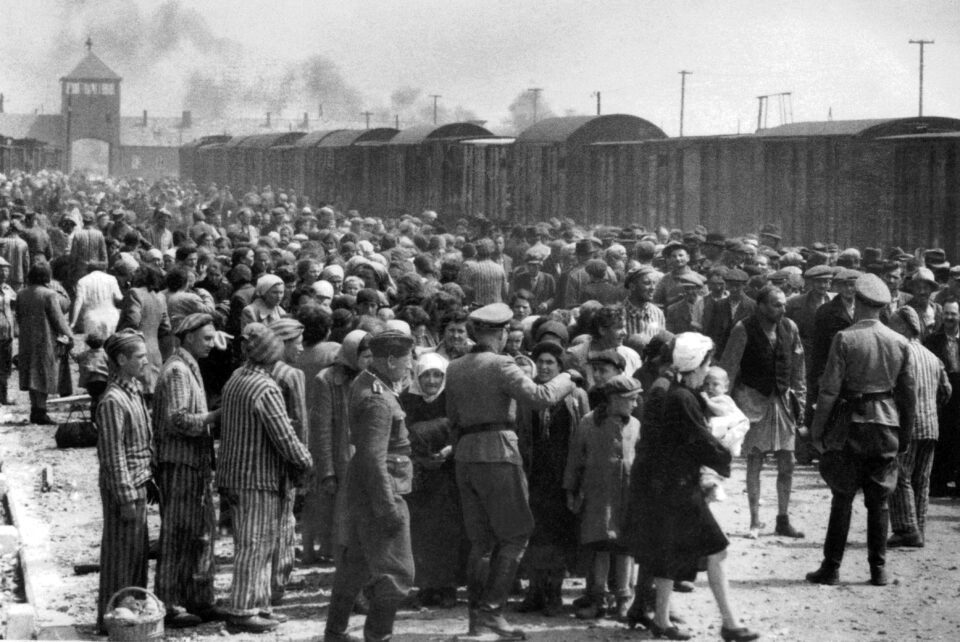Image: “Selection” of Hungarian Jews on the ramp at Auschwitz II-Birkenau, May/June 1944.
Back on 26 January David Seymour spoke at an event hosted by the Holocaust Centre of NZ the day before the 80th anniversary of the liberation of Auschwitz-Birkenau.
I have long feared that the horrors of WW2 would slip from living memory. As a nine year old, I had a teacher who talked often about her own schooling in fear of a Japanese invasion. It stuck with me that children had to practice evacuating and sit in trenches with cotton wool in their ears and corks between their teeth. That teacher retired at the end of that year, and I wondered how students in the next class would know about the war.
Of course, I couldn’t have known about the Holocaust Centre, it was founded 15 years later. The Centre could be seen as a response to the task of keeping these memories real when only a precious few, whom I acknowledge today, can remind us of the horrors first hand.
It falls on each of us to make a conscious effort to keep the lessons learned alive. One of the most helpful tools we have for doing that is the Universal Declaration of Human Rights, signed at Paris in the aftermath of WW2 by our then Prime Minister Peter Fraser.
The War and the Holocaust gave people clarity of thought. In those painful times it didn’t take much effort to think clearly about what was right, what was wrong, and what must be avoided at all costs.
The preamble of the Declaration begins; Whereas recognition of the inherent dignity and of the equal and inalienable rights of all members of the human family is the foundation of freedom, justice and peace in the world. Whereas disregard and contempt for human rights have resulted in barbarous acts which have outraged the conscience of mankind, and the advent of a world in which human beings shall enjoy freedom of speech and belief and freedom from fear and want has been proclaimed as the highest aspiration of the common people …
The Declaration then lists Human Rights in a series of articles. Article One says: All human beings are born free and equal in dignity and rights. They are
endowed with reason and conscience and should act towards one another in a spirit of brotherhood. Article Two is more specific; Everyone is entitled to all the rights and freedoms set forth in this Declaration, without distinction of any kind, such as race, colour, sex, language, religion, political or other opinion, national or social origin, property, birth or other status. Furthermore, no distinction shall be made on the basis of the political, jurisdictional or international status of the country or territory to which a person belongs, whether it be independent, trust, non-self-governing or under any other limitation of sovereignty.
Just as the Holocaust brought great clarity of thought in its aftermath, disordered thinking brings great danger that something like it will be repeated.
Sir Karl Popper, a Jewish Philosopher who lost 16 members of his own family to the Holocaust and found refuge in New Zealand, was responsible for defining the scientific method. Through the early and mid-twentieth centuries, Popper won the argument about how science proceeds. His approach, testing falsifiable hypotheses against empirically verifiable facts, is wonderfully equalitarian and democratic. He showed, like Galileo before him, that no matter who you are, if your idea stacks up, plain for all to see, that you can make a breakthrough. It doesn’t just apply in science. As Popper himself said, all life is problem solving.
In contrast to that liberal vision, we hear that people can have knowledge according to their identity. People say ‘speaking as a…’. There are different kinds of knowledge that always turn on identity. These are dangerous thoughts. They deny the ability of any individual to see truth according to an agreed method. They take you down the path to where might is right.
I had an email from a younger person than me over the summer, worried about the fate of liberalism. I said, perhaps we need a new [Popper] book. He said, perhaps, but first we should all reread Popper’s Open Society and its Enemies. I’m taking his advice.
My challenge in a YouTube world is that we should all read more. As the Holocaust’s horrors slip from living memory, my challenge is to read the Universal Declaration of Human Rights, and The Open Society, for lessons we must not forget.


